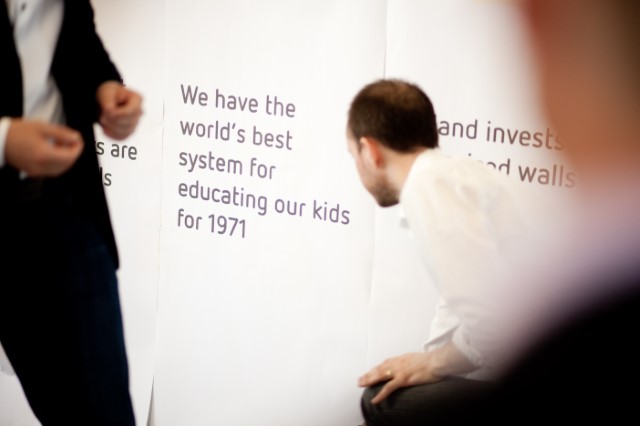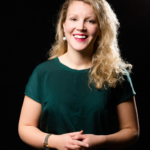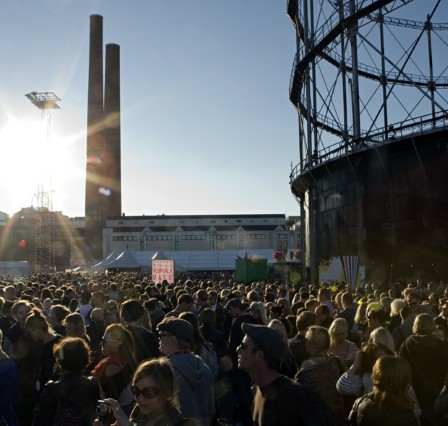How do we enable students, schools and communities to become building blocks of a sustainable well-being society? Meet the authors of Sitra’s Education for a Changing World research project.
Sustainability has been in schools one way or another for 30 years. However, our societies and the challenges we face have changed tremendously during this time and the need for holistic action is greater than ever. It is time to move beyond school recycling programmes and start building the bigger picture of sustainability in education and in schools.
At Sitra, we have developed a societal model organised around the central theme of “sustainable well-being”. Building on the achievements of the welfare state, the sustainable well-being society will be oriented toward the central aim of human well-being. Planetary limits will form the basis of all human activity while robust systems of human and social capital will be realised alongside more efficient economic and governance models. A structural transition such as this is immensely complex and will touch every sector, organisation and institution – including education.
To this end, Sitra opened a call for authors last June for the “Education for a Changing World” research project that aims to explore the intersection of sustainability, well-being and education for a globalised society. The research gathers insights from multiple fields to help inform the global debate about the purpose and future of education as an essential public good.
“Education systems are likely to be significantly altered by megatrends like improving technology and the need for sustainability,” says Sitra’s Justin Cook, the project manager for the research project. “Do our school systems have the capability to renew themselves in order to adapt to rising complexity in society which affects every sector of life from job markets to family relations? Our aim is to find out how.”
The open call attracted a tremendous amount of interest and 14 authors were chosen from the crowd. The aim was to form a multidisciplinary group of writers who come from academia as well as from other sectors of society. Another factor we were interested in was the innovativeness of each applicant’s article idea.
“Currently, education systems worldwide accentuate achievement of society’s short-term economic targets. However, for the future of our civilisation, there cannot be more important targets for education systems than leading the way towards a sustainable future and well-being,” explains Erkka Laininen, one of the authors.
“I believe this can only be achieved through seeing the purpose of education not only as learning but also making this change at the levels of individuals, organisations and societies. As a developer of education, my most important mission is to be part of this transition process,” Laininen continues.
The project is organised as a transatlantic collaboration, combining interdisciplinary Finnish and North American perspectives on teaching and learning. One of the project goals is to produce a high-value publication that is timely and applicable to the international, interdisciplinary discourse through an interactive process. The project will also seek to form an international network of thought leaders working to renew education for the future.
Interested in joining a network and the dialogue on sustainability and education? Join us on Facebook, Twitter (#educationfutures) or get in touch directly.
Meet the authors
|
Stacey Caillier and Rob Riordan, High Tech High Stacey Caillier is Director at High Tech High’s Center for Research on Equity and Innovation in San Diego. She is passionate about the potential for practice-oriented forms of research – such as action research and improvement research – to transform schools by encouraging educators and students to explore their passions while working towards more equitable and engaging learning environments. Rob Riordan, retired, is a co-founder of High Tech High and former President of the High Tech High Graduate School of Education. Rob has been a teacher, trainer and programme developer for over 40 years, and has worked with teams to develop 14 new schools (11 at High Tech High) spanning the primary and secondary education. |
|
Charles Fadel, Center for Curriculum Redesign Charles Fadel is a founder and Chairman of the Center for Curriculum Redesign in Cambridge, Massachusetts, and a global education thought leader and expert, author and inventor. Among other activities, he is a visiting practitioner at Harvard’s Graduate School of Education, exploring curriculum redesign concepts. |
|
Harold Glasser, Western Michigan University Harold Glasser is the Executive Director for Campus Sustainability and Professor of Environmental Studies at Western Michigan University. He works at the nexus where environmental science, policy, philosophy, values, business, design, economics, history and education meet. His research focuses on the evaluation of complex environmental problems and the process of making individual and social choices about using and protecting the environment (past, present and future). |
|
Erkka Laininen, OKKA Foundation (website in Finnish) Erkka Laininen is a Planning Manager for the OKKA Foundation in Helsinki, Finland. He works with, among other things, sustainability certification for educational organisations. The OKKA Foundation is a foundation for teaching, education and personal development supporting the educational sector. |
|
Anna Lehtonen, Hannele Cantell and Arto O. Salonen, University of Helsinki Anna Lehtonen is an expert and researcher in climate change education. In 2014, she worked for the Finnish Climate Panel. She is currently a doctoral student at the University of Helsinki in the department of Teacher Education. Hannele Cantell (Adjunct Professor, PhD) is working as a teacher educator at the University of Helsinki, Department of Teacher Education. She is a member of Finnish Climate panel, representing behavioural sciences. Cantell has also been a member of curriculum groups (basic education and upper secondary education) in the Finnish National board of education. Arto O. Salonen (Adjunct Professor, PhD) is an expert of Education for Sustainable Development (ESD). His research is in social change in order to have flourishing life now and in the future. The Finnish National Board of Education adopted the concept of the Ecosocial Approach to Education (ekososiaalinen sivistys) launched by Salonen, to be the key concept of human values and growth in basic education and upper secondary education in Finland. |
|
Tarja Meristö, Laurea University of Applied Sciences, Espoo Tarja Meristö DSc (Econ) is a principal lecturer at Laurea University of Applied Sciences, working as an expert on well-being and business, and the leader of the FuturesLab Cofi research team. She has over 35 years’ experience as a business futurist within diverse lines of business, such as machine industry, health and well-being, and information technology. |
|
Linda Nathan, Boston University and Harvard Graduate School of Education Linda Nathan is the founding headmaster of Boston Arts Academy, Boston’s first public high school for the visual and performing arts. Dr Nathan is a nationally and internationally recognised leader in education reform, and has lectured and written widely on topics ranging from the importance of arts education to developing schools centred on equity to developing strong structures that support teachers and leaders. |
|
Marjo Kyllönen, City of Helsinki Dr Marjo Kyllönen is the education manager at the General Education division for the City of Helsinki. After defending her thesis on the Future School and Leadership in December 2011, she has developed further the concept of the future school and its role and prospect in society. She also has a degree in primary and early childhood education and has worked as a primary school teacher. |
|
Asta Raami, Independent researcher Asta Raami works as an independent intuition researcher, lecturer, writer and educator. Asta has several years’ experience in working as a lecturer of creativity development in Aalto University ARTS in Helsinki and is one of the founders of ASI, Aalto Social Impact. |
|
Adam Rubin, 2Revolutions Adam has spent over two decades catalysing change through the design and launch of social enterprises across the education and community development sectors. He started 2Revolutions, an education design lab that designs and launches Future of Learning models and catalyses the conditions within which they can thrive, to reinforce a belief that two critical levers we can pull are the birth and scaling of innovative ventures as a way to affect real change. |
|
Jari Salminen, University of Helsinki Jari is the Principal investigator in the Department of Teacher Education at the University of Helsinki. He spent the early years of his career as a teacher in a communal school in Helsinki and later worked in different research positions at the University of Helsinki. |





Recommended